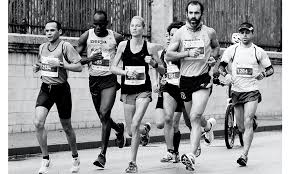At mile 20 of a marathon, the body starts whispering doubts. Legs ache. Breathing gets harder. Every step feels heavier than the last. But the runners who cross the finish line don’t just rely on training plans and nutrition strategies they rely on something deeper, quieter, and much harder to measure: mental strength.
For elite and amateur runners alike, the real challenge of the marathon isn’t always physical. It’s mental. And the way they train their minds is as deliberate and disciplined as their weekly mileage.
Take any seasoned marathoner, and you’ll find someone who has learned to negotiate with pain. Not fight it, but dance with it. They practice pushing through long runs not just to condition their bodies, but to simulate the emotional rollercoaster that comes late in the race the moment where finish lines still feel far and fatigue starts to lie.
Mental training comes in many forms. Some runners swear by visualization closing their eyes the night before a race and walking through every stretch of the course in their mind. They picture the hills, the crowds, the moment their legs begin to burn. When it happens for real, it feels like déjà vu. They’ve already been there.
Others rely on mantras. Simple phrases, repeated over and over until they become part of their rhythm. “Strong and steady.” “This is what you trained for.” When the voice of doubt gets loud, these mantras answer back with calm certainty.
Mindfulness has become a quiet revolution in the running world, too. More athletes now use meditation not to escape the pain, but to accept it. They focus on the breath, on the present moment. They don’t fear discomfort they observe it, breathe through it, and keep moving.
And then there’s the art of breaking it down. Ask a marathoner how they get through 42 kilometers, and they’ll often say: “I didn’t run a marathon. I ran one mile. Then another.” By setting micro-goals just make it to the next corner, the next water station, the next beat of a playlist they shrink the distance and quiet the panic.
It’s a kind of mental alchemy: turning struggle into strategy, pain into progress. These aren’t just coping mechanisms they’re weapons. Honed through repetition. Sharpened by setbacks. Powered by belief.
Because in the end, the finish line isn’t just a physical place. It’s the reward for thousands of quiet mental victories. And that’s what separates those who run from those who endure.

